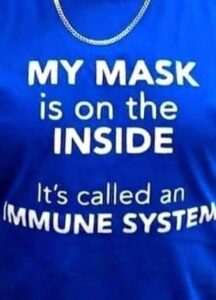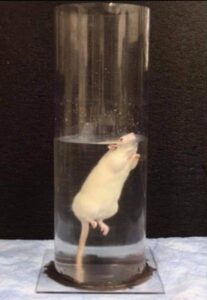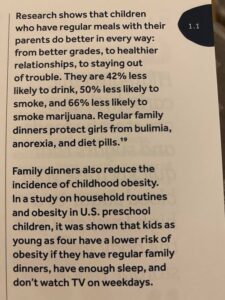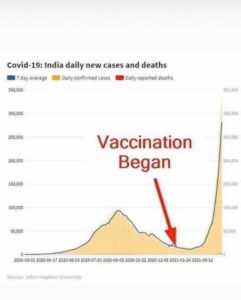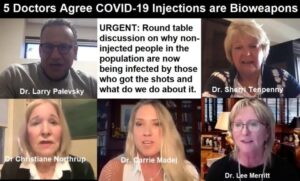Why I Won’t Be Getting the Vaccine
A few friends have asked my thoughts on the COVID jab(s) so I thought it was time to write an article on the topic. All my friends had not heard most of the details I shared, so I figured you might appreciate hearing some of what I told them. Knowing how contentious this issue is, part of me would rather just write about something else, but I feel like the discussion/news is so one-sided that I should speak up.
As I always strive to do, I promise to do my best to be level-headed and nonhysterical. I’m not here to pick a fight with anyone, just to walk you through some of what I’ve read, my lingering questions, and explain why I can’t make sense of these COVID vaccines.
1. Vaccine Makers Are Immune From Liability
The only industry in the world that bears no liability for injuries or deaths resulting from their products are vaccine makers. First established in 1986 with the National Childhood Vaccine Injury Act,1 and reinforced by the PREP Act,2 vaccine makers cannot be sued, even if they are shown to be negligent.
The COVID vaccine makers are allowed to create a one-size-fits-all product, with no testing on sub-populations (i.e., people with specific health conditions), and yet they are unwilling to accept any responsibility for any adverse events or deaths their products cause.
If a company is not willing to stand behind their product as safe, especially one they rushed to market and skipped animal trials on, I am not willing to take a chance on their product. No liability. No trust. Here’s why:
2. The Checkered Past of the Vaccine Companies
The four major companies that are making these COVID vaccines are/have either:
Never brought a vaccine to market before COVID (Moderna and Johnson & Johnson).
Are serial felons (Pfizer and AstraZeneca).
Are both (Johnson & Johnson).
Moderna had been trying to “Modernize our RNA”3 (thus the company name) for years but had never successfully brought any product to market — how nice for them to get a major cash infusion4 from the government to keep trying.
In fact, all major vaccine makers (save Moderna) have paid out tens of billions of dollars in damages for other products they brought to market when they knew those products would cause injuries and death — see Vioxx,5 Bextra,6 Celebrex,7 Thalidomide8 and opioids9 as a few examples.
If drug companies willfully choose to put harmful products in the market, when they can be sued, why would we trust any product where they have NO liability? In case it hasn’t sunk in, let me reiterate: Three of the four COVID vaccine makers have been sued for products they brought to market even though they knew injuries and deaths would result.
Johnson & Johnson has lost major lawsuits in 1995, 1996, 2001, 2010, 2011, 2016 and 2019.10 (For what it’s worth, J&J’s vaccine also contains tissues from aborted fetal cells, perhaps a topic for another discussion).
Pfizer has the distinction of the biggest criminal payout in history. They have lost so many lawsuits it’s hard to count. You can check out their rap sheet here.12 Maybe that’s why they are demanding that countries where they don’t have liability protection13 put up collateral14 to cover vaccine-injury lawsuits.
AstraZeneca has similarly lost so many lawsuits it’s hard to count. Here’s one.15 Here’s another16 — you get the point. And in case you missed it, the company had their COVID vaccine suspended in at least 18 countries17 over concerns of blood clots, and they completely botched their meeting with the FDA18 with numbers from their study that didn’t match.
Oh — and apparently J&J (whose vaccine is approved for “Emergency Use”19 in the U.S.) and AstraZeneca (whose vaccine is not approved for “Emergency Use” in the U.S.) had a little mix up in their ingredients20 — in 15 million doses. Oops.
Let me reiterate this point: Given the free pass from liability, and the checkered past of these companies, why would we assume that all their vaccines are safe and made completely above board? Where else in life would we trust someone with that kind of reputation?
To me that makes as much sense as expecting a remorseless, abusive, unfaithful lover to become a different person because a judge said deep down they are a good person. No. I don’t trust them. No liability. No trust. Here’s another reason why I don’t trust them:
3. The Ugly History of Attempts to Make Coronavirus Vaccines
There have been many attempts to make viral vaccines in the past that ended in utter failure, which is why we did not have a coronavirus vaccine in 2020. In the 1960s, scientists attempted to make an RSV (respiratory syncytial virus) vaccine for infants. In that study,21 they skipped animal trials because they weren’t necessary back then.
In the end, the vaccinated infants got much sicker than the unvaccinated infants when exposed to the virus in nature, with 80% of the vaccinated infants requiring hospitalization, and two of them died.22
After 2000, scientists made many attempts to create coronavirus vaccines. For the past 20 years, all ended in failure because the animals in the clinical trials got very sick and many died, just like the children in the 1960s. You can read a summary of this history/science here.23 Or, if you want to read the individual studies you can check out these links:
In 2004, attempted vaccine produced hepatitis in ferrets.24
In 2005, mice25 and civets26 became sick and more susceptible to coronaviruses after being vaccinated.
In 2012, the ferrets27 became sick and died. And in this study28 mice and ferrets developed lung disease.
In 2016, this study29 also produce lung disease in mice.
The typical pattern in the studies mentioned above is that the children and the animals produced beautiful antibody responses after being vaccinated. The manufacturers thought they hit the jackpot. The problem came when the children and animals were exposed to the wild version of the virus.
When that happened, an unexplained phenomenon30 called antibody dependent enhancement (ADE), also known as vaccine enhanced disease31 (VED), occurred where the immune system produced a “cytokine storm”32 (i.e., overwhelmingly attacked the body), and the children/animals died. Here’s the lingering issue.
The vaccine makers have no data to suggest their rushed vaccines have overcome that problem. In other words, never before has any attempt to make a coronavirus vaccine been successful, nor has the gene-therapy technology that is mRNA “vaccines” been safely brought to market but, hey, since they had billions of dollars33 in government funding, I’m sure they figured that out. Except they don’t know if they have.
4. The ‘Data Gaps’ Submitted to the FDA by the Vaccine Makers
When vaccine makers submitted their papers to the FDA for the emergency use authorization34 (Note: An EUA is not the same as a full FDA approval), among the many “data gaps” they reported was that they have nothing in their trials to suggest they overcame that pesky problem of vaccine enhanced disease.
They simply don’t know — i.e., they have no idea if the vaccines they’ve made will also produce the same cytokine storm (and deaths) as previous attempts at such products. As Dr. Joseph Mercola points out:
“Previous attempts35 to develop an mRNA-based drug using lipid nanoparticles failed and had to be abandoned because when the dose was too low, the drug had no effect, and when dosed too high, the drug became too toxic. An obvious question is: What has changed that now makes this technology safe enough for mass use?”
If that’s not alarming enough, here are other gaps in the data — i.e., there are no data to suggest safety or efficacy regarding:
Anyone younger than age 18 or older than age 55
Pregnant or lactating mothers
Autoimmune conditions
Immunocompromised individuals
No data on transmission of COVID
No data on preventing mortality from COVID
No data on duration of protection from COVID
Hard to believe, right? In case you think I’m making this up, or want to see the actual documents sent to the FDA by Pfizer and Moderna for their emergency use authorization, you can check out this36 or this37 respectively. The data gaps can be found starting with page 46 and 48 respectively.
For now, let’s turn our eyes to the raw data the vaccine makers used to submit for emergency use authorization.
5. No Access to the Raw Data From the Trials
Would you like to see the raw data that produced the “90% and 95% effective” claims touted in the news? Me too. But they won’t let us see that data. As pointed out in the BMJ,38 something about the Pfizer and Moderna efficacy claims smells really funny.
There were “3,410 total cases of suspected, but unconfirmed COVID-19 in the overall study population, 1,594 occurred in the vaccine group versus 1,816 in the placebo group.”
Wait, what? Did they fail to do science in their scientific study by not verifying a major variable? Could they not test those “suspected but unconfirmed” cases to find out if they had COVID? Apparently not. Why not test all 3,410 participants for the sake of accuracy? Can we only guess they didn’t test because it would mess up their “90-95% effective” claims? Where’s the FDA?
Would it not be prudent for the FDA to expect (demand) that the vaccine makers test people who have “COVID-like symptoms” and release their raw data so outside, third-parties could examine how the manufacturers justified the numbers? I mean it’s only every citizen of the world we’re trying to get to take these experimental products.
Why did the FDA not require that? Isn’t that the entire purpose of the FDA anyway? Good question. Foxes guarding the hen house? Seems like it. No liability. No trust.
6. No Long-Term Safety Testing
Obviously, with products that have only been on the market a few months, we have no long-term safety data. In other words, we have no idea what this product will do in the body months or years from now — for ANY population. Given all the risks above (risks that ALL pharmaceutical products have), would it not be prudent to wait to see if the worst-case scenarios have indeed been avoided?
Would it not make sense to want to fill those pesky “data gaps” before we try to give this to every man, woman and child on the planet? Well, that would make sense, but to have that data, they need to test it on people, which leads me to my next point.
7. No Informed Consent
What most who are taking the vaccine don’t know is that because these products are still in clinical trials, anyone who gets the shot is now part of the clinical trial. They are part of the experiment. Those (like me) who do not take it, are part of the control group.
Time will tell how this experiment works out. But, you may be asking, if the vaccines are causing harm, wouldn’t we be seeing that all over the news? Surely the FDA would step in and pause the distribution? Well, if the adverse events reporting system39 were working, maybe things would be different.
8. Underreporting of Adverse Reactions and Death
According to a study done by Harvard40 (at the commission of our own government), less than 1% of all adverse reactions to vaccines are actually submitted to the national Vaccine Adverse Events Reports System (VAERS) — read page 6 of the Harvard study.41
While the problems with VAERS have not been fixed (as you can read about in this letter to the CDC42), at the time of this writing VAERS reports43 over 2,200 deaths from the current COVID vaccines, as well as close to 60,000 adverse reactions.
“VAERS data released today showed 50,861 reports of adverse events following COVID vaccines, including 2,249 deaths and 7,726 serious injuries between Dec. 14, 2020 and March 26, 2021.”
And those numbers don’t include (what is currently) 578 cases of Bell’s Palsy.44 If those numbers are still only 1% of the total adverse reactions (or 0.8 to 2% of what this study45 published recently in JAMA found), you can do the math, but that equates to somewhere around 110,000 to 220,000 deaths from the vaccines to date, and a ridiculous number of adverse reactions.
Bet you didn’t see that on the news. That death number would currently still be lower than the 424,000 deaths from medical errors that happen every year (which you probably also don’t hear about), but we are not even six months into the rollout of these vaccines yet.
If you want a deeper dive into the problems with the VAERS reporting system, you can check this out46 or check this out.47 But then there’s my next point, which could be argued makes these COVID vaccines seem pointless.
9. The Vaccines Do Not Stop Transmission or Infection
Wait, what? Aren’t these vaccines supposed to be what we’ve been waiting for to “go back to normal”? Nope. Why do you think we’re getting all these conflicting messages48 about needing to practice social distancing and wear masks AFTER we get a vaccine?
The reason is because these vaccines were never designed to stop transmission OR infection. If you don’t believe me, I refer you again to the papers submitted to the FDA I referenced above. The primary endpoint (what the vaccines are meant to accomplish) is to lower your symptoms.
Sounds like just about every other drug on the market, right? That’s it — lowering your symptoms is the big payoff we’ve been waiting for. Does that seem completely pointless to anyone but me?
It can’t stop us from spreading the virus.
It can’t stop the virus from infecting us once we have it.
To get the vaccine is to accept all the risk of these experimental products49 and the best it might do is lower symptoms?
Heck, there are plenty of other things I can do to lower my symptoms that don’t involve taking what appears to be a really risky product. Now for the next logical question: If we’re worried about asymptomatic spreaders, would the vaccine not make it more likely that we are creating asymptomatic spread?
If it indeed reduces symptoms, anyone who gets it might not even know they are sick and thus they are more likely to spread the virus, right? For what it’s worth, I’ve heard many people say the side effects of the vaccine (especially the second dose) are worse than catching COVID. I can’t make sense of that either.
Take the risk. Get no protection. Suffer through the vaccine side effects. Keep wearing your mask and social distancing. And continue to be able to spread the virus. What? It gets worse.
10. People Are Catching COVID After Being Fully Vaccinated
Talk about a bummer. You get vaccinated and you still catch COVID.
It’s happening in Washington State50
It’s happening in New York51
It’s happening in Michigan52
It’s happening in Hawaii53
It’s happening in several other states too54
It happened to 80% of 35 nuns who got the vaccine in Kentucky.55 Two of them died, by the way
In reality, this phenomenon is probably happening everywhere, but those are the ones making the news now. Given the reasons above (and what’s below), maybe this doesn’t surprise you, but bummer if you thought the vaccine was a shield to keep you safe. It’s not.
That was never the point. If 66% of health care workers in L.A.56 are going to delay or skip the vaccine, maybe they aren’t wowed by the rushed science either. Maybe they are watching the shady way deaths and cases are being reported.
11. The Overall Death Rate From COVID
According to the CDC’s own numbers, COVID has a 99.74% survival rate.57 Why would I take a risk on a product, that doesn’t stop infection or transmission, to help me overcome a cold that has a .26% chance of killing me — actually in my age range it has about a 0.1% chance of killing me (and .01% chance of killing my kids), but let’s not split hairs here.
With a bar (death rate) that low, we will be in lockdown every year, i.e., forever. But wait, what about the 500,000 plus deaths — that’s alarming, right? I’m glad you asked.
12. The Bloated COVID Death Numbers
Something smells really funny about this one. Never before in the history of death certificates has our own government changed how deaths are reported. Why now, are we reporting everyone who dies with COVID in their body, as having died of COVID, rather than the comorbidities that actually took their life?
Until COVID, all coronaviruses (common colds) were never listed as the primary cause of death when someone died of heart disease, cancer, diabetes, autoimmune conditions, or any other major comorbidity. The disease was listed as the cause of death, and a confounding factor like flu or pneumonia was listed on a separate line.
To bloat the number even more, both the WHO and the CDC changed their guidelines such that those who are suspected or probable58 (but were never confirmed) of having died of COVID are also included in the death numbers. Seriously?
If we are going to do that then should we not go back and change the numbers of all past cold and flu seasons so we can compare apples to apples when it comes to death rates? According to the CDC’s own numbers,59 (scroll down to the section “Comorbidities and other conditions”) only 6% of the deaths being attributed to COVID are instances where COVID seems to be the only issue at hand.
In other words, reduce the death numbers you see on the news by 94% and you have what is likely the real numbers of deaths from just COVID. Even if the former CDC director60 is correct and COVID-19 was a lab-enhanced virus61 (see Reason No. 14 below), a 0.26% death rate is still in line with the viral death rate that circles the planet every year.
Then there’s this Fauci guy.62 I’d really love to trust him, but besides the fact that he hasn’t treated one COVID patient, you should probably know:
13. Fauci and 6 Others at NIAID Own Patents in Moderna’s Vaccine
Thanks to the Bayh-Dole Act,63 government workers are allowed to file patents on any research they do using taxpayer funding. Tony Fauci owns over 1,000 patents (see this video for more details64), including patents being used on the Moderna vaccine, which he approved government funding for.
In fact, the NIH (which NIAID is part of) claims joint ownership65 of Moderna’s vaccine. Does anyone else see this as a MAJOR conflict of interest, or criminal even? I say criminal because there’s also this pesky problem that makes me even more distrustful of Fauci, NIAD and the NIH in general.
14. Fauci’s on the Hot Seat for Illegal Gain-of-Function Research
What is “gain-of-function”66 research? It’s where scientists attempt to make viruses gain functions — i.e., make them more transmissible and deadlier. Sounds at least a touch unethical, right? How could that possibly be helpful? Our government agreed and banned the practice.67
So what did the Fauci-led NIAID do? They pivoted and outsourced the gain-of-function research68 (in coronaviruses no less) to China — to the tune of a $600,000 grant. You can see more details, including the important timeline of these events in this fantastically well-researched documentary.69
Dr. Fauci, you have some explaining to do, and I hope the cameras are recording when you have to defend your actions. For now, let’s turn our attention back to the virus.
15. The Virus Continues to Mutate
Not only does the virus (like all viruses) continue to mutate, but according to world-renowned vaccine developer Dr. Geert Vanden Bossche70 (whom you’ll meet below if you don’t know him) it’s mutating about every 10 hours. How in the world are we going to keep creating vaccines to keep up with that level of mutation?
We’re not. Might that also explain why fully vaccinated people are continuing to catch COVID?71 Why, given that natural immunity has never ultimately failed humanity, do we suddenly not trust it?
Why, if I ask questions like the above, or post links like what you find above, will my thoughts be deleted72 from all major social media platforms? That brings me to the next troubling problem I have with these vaccines.
16. Censorship — and the Complete Absence of Scientific Debate
I can’t help but get snarky here, so humor me. How did you enjoy all those nationally and globally-televised, robust debates put on by public health officials, and broadcast simultaneously on every major news station?
Wasn’t it great hearing from the best minds in medicine, virology, epidemiology, economics and vaccinology from all over the world as they vigorously and respectfully debated things like:
Lockdowns
Mask wearing
Social-distancing
Vaccine efficacy73 and safety trials
How to screen for susceptibility to vaccine injury
Therapeutics, (i.e., non-vaccine treatment options)
Wasn’t it great seeing public health officials (who never treated anyone with COVID) have their “science” questioned? Wasn’t it great seeing the FDA panel publicly grill the vaccine makers in prime time as they stood in the hot-seat of tough questions about products of which they have no liability? Oh, wait, you didn’t see those debates?
No, you didn’t — because they never happened. What happened instead was heavy-handed censorship of all but one narrative. Ironically, Mark Zuckerberg can question vaccine safety,74 but I can’t? Hypocrite? When did the First Amendment become a suggestion?
It’s the FIRST Amendment75 Mark — the one our founders thought was most important. With so much at stake, why are we fed only one narrative — shouldn’t many perspectives be heard and professionally debated?
What has happened to science? What has happened to the scientific method of always challenging our assumptions? What happened to lively debate in this country, or at least in Western society? Why does anyone who disagrees with the WHO or the CDC get censored so heavily? Is the science of public health a religion now, or is science supposed to be about debate?
If someone says “the science is settled” that’s how I know I’m dealing with someone who is closed minded. By definition science (especially biological science) is never settled. If it were, it would be dogma, not science. OK, before I get too worked up, let me say this:
I want to be a good citizen. I really do. If lockdowns work, I want to do my part and stay home. If masks work, I want to wear them. If social distancing is effective, I want to comply. But, if there is evidence they don’t (masks for example76), I want to hear that evidence too.
If highly-credentialed scientists have different opinions, I want to know what they think. I want a chance to hear their arguments and make up my own mind. I don’t think I’m the smartest person in the world, but I think I can think. Maybe I’m weird, but if someone is censored, then I REALLY want to hear what they think.
Don’t you? To all my friends who don’t have a problem with censorship, will you have the same opinion when what you think is censored? Is censorship not the technique of dictators, tyrants and greedy, power-hungry people? Is it not a sign that those who are doing the censoring know it’s the only way they can win?
What if a man who spent his entire life developing vaccines was willing to put his entire reputation on the line and call on all global leaders to immediately stop the COVID vaccines because of problems with the science?
What if he pleaded for an open scientific debate on a global stage? Would you want to hear what he has to say? Would you want to see the debate he’s asking for?
17. The World’s Leading Vaccinologist Is Sounding the Alarm
Here is what may be the biggest reason this COVID vaccine doesn’t make sense to me. When someone who is very pro-vaccine, who has spent his entire professional career overseeing the development of vaccines, is shouting from the mountaintops that we have a major problem, I think the man should be heard.
In case you missed it, and in case you care to watch it, here is Dr. Geert Vanden Bossche,77 explaining:
Why the COVID vaccine may be putting so much pressure on the virus that we are accelerating its ability to mutate and become deadlier.
Why the COVID vaccines may be creating vaccine-resistant viruses (similar to antibiotic resistant bacteria).
Why, because of previous problems with antibody dependent enhancement, we may be looking at a mass casualty event in the next few months/years.
If you want to see/read about a second, and longer, interview with Vanden Bossche, where he was asked some tough questions, you can check this out.78 If half of what he says comes true, these vaccines could be the worst invention of all time. If you don’t like his science, take it up with him. I’m just the messenger. But I can also speak to COVID personally.
18. I Already Had COVID
I didn’t enjoy it. It was a nasty cold for two days:
Unrelenting butt/low-back aches
Very low energy
Low-grade fever
It was weird not being able to smell anything for a couple days. A week later, coffee still tasted a little “off.” But I survived. Now it appears (as it always has) that I have beautiful, natural, lifelong immunity79 — not something likely to wear off in a few months if I get the vaccine.
In my body and my household, COVID is over. In fact, now that I’ve had it, there is evidence the COVID vaccine might actually be more dangerous80 for me. That is not a risk I’m willing to take.
In Summary
The above are just my reasons for not wanting the vaccine. Maybe my reasons make sense to you, maybe they don’t. Whatever does makes sense to you, hopefully we can still be friends. I for one think there’s a lot more that we have in common than what separates us.
We all want to live in a world of freedom.
We all want to do our part to help others and to live well.
We all want the right to express our opinions without fearing we’ll be censored or viciously attacked.
We all deserve to have the access to the facts so we can make informed decisions.
Agree or disagree with me; I’ll treat you no differently. You’re a human just as worthy of love and respect as anyone else. For that I salute you, and I truly wish you all the best. I hope you found this helpful. If so, feel free to share. If not, feel free to (kindly) let me know what didn’t make sense to you and I’d be happy to hear your thoughts too. Stay curious and stay humble.
https://articles.mercola.com/sites/articles/archive/2021/04/27/reasons-not-to-get-covid-vaccine.aspx
References
1 Congress.gov, National Childhood Vaccine Injury Act
https://www.congress.gov/bill/99th-congress/house-bill/5546
2 PHE.gov, Public Readiness and Emergency Preparedness Act
https://www.phe.gov/Preparedness/legal/prepact/Pages/default.aspx
3 Moderna, mRNA Platform: Enabling Drug Discovery & Development
https://www.modernatx.com/mrna-technology/mrna-platform-enabling-drug-discovery-development
4 CNN August 11, 2020
https://www.cnn.com/2020/08/11/health/moderna-vaccine-government-deal/index.html
5 Vail Daily April 21, 2006
6 CNN September 2, 2009
https://edition.cnn.com/2009/BUSINESS/09/02/Pfizer.fine/index.html
7 Medial Xpress March 25, 2021
https://medicalxpress.com/news/2021-03-fda-panel-pfizer-arthritis-drug.html
8 Helix July 28, 2009
https://helix.northwestern.edu/article/thalidomide-tragedy-lessons-drug-safety-and-regulation
9 The New York Times August 26, 2019
https://www.nytimes.com/2019/08/26/health/oklahoma-opioids-johnson-and-johnson.html
10 The Defender March 15, 2021
Johnson & Johnson Has a Long Rap Sheet — Why Should We Trust Its Vaccine?
11 KHOU March 8, 2021
https://www.khou.com/article/news/verify/johnson-and-johnson-aborted-fetal-cells-verify/285-6d4fe5ba-3763-
4d4e-ba32-294f3fa39020
12 MP-22.com, Pfizer Corporate Full Rap Sheet
https://www.mp-22.com/vax
13 WION February 24, 2021
https://www.wionews.com/world/how-pfizer-tried-to-bully-argentina-and-brazil-in-exchange-for-vaccines-366037
14 The Defender March 9, 2021
Pfizer Demands Nations Put Up Collateral to Cover Vaccine Injury Lawsuits
15 The United States Department of Justice April 27, 2010
https://www.justice.gov/opa/pr/pharmaceutical-giant-astrazeneca-pay-520-million-label-drug-marketing
16 Reuters August 8, 2018
https://www.reuters.com/article/us-astrazeneca-texas-lawsuits-idUSKBN1KT0Q9
17 Business Insider March 16, 2021
https://www.businessinsider.com/astrazeneca-covid-vaccine-countries-suspend-denmark-thailand-batch-bloodclots-2021-3?op=1
18 The Highwire March 26, 2021
(Video no longer available.)
19 MSN News February 28, 2021
https://www.msn.com/en-us/news/us/fda-grants-emergency-authorization-to-johnson-johnson-vaccine/arBB1e4Skt
20 The Defender April 1, 2021
15 million J&J COVID Vaccines Thrown Away After Ingredient Mix-Up With AstraZeneca
21 Nature October 16, 2020
https://www.nature.com/articles/s41579-020-00462-y#Sec11
22 Nature October 16, 2020
https://www.nature.com/articles/s41579-020-00462-y#Sec11
23 Frontiers in Microbiology December 5, 2018
https://www.frontiersin.org/articles/10.3389/fmicb.2018.02991/full
24 J Virol. 2004 Nov; 78(22): 12672–12676
https://www.ncbi.nlm.nih.gov/pmc/articles/PMC525089/
25 Nature January 10, 2005
https://www.nature.com/news/2005/050110/full/050110-3.html#ref-CR1
26 PNAS January 18, 2005
https://www.pnas.org/content/102/3/797
27 PLoS One. 2012; 7(4): e35421
https://www.ncbi.nlm.nih.gov/pmc/articles/PMC3335060/
28 PLoS One. 2012; 7(4): e35421
https://www.ncbi.nlm.nih.gov/pmc/articles/PMC3335060/
29 Human Vaccines & Immunotherapeutics June 7, 2016
https://www.tandfonline.com/doi/full/10.1080/21645515.2016.1177688?scroll=top&needAccess=true
30 Science February 13, 2004
https://science.sciencemag.org/content/303/5660/944.abstract
31 The Defender December 10, 2020
Pfizer COVID Vaccine Trial Shows Alarming Evidence of Pathogenic Priming in Older Adults
32 The Defender February 19, 2021
Are We on the Verge of a ‘Super-Epidemic’ of Autoimmune Diseases?
33 CDC April 6, 2021
https://www.cdc.gov/media/releases/2021/p0407-covid-19-vaccine-programs.html
34 FDA.gov, Investigational New Drug (IND) Application
https://www.fda.gov/drugs/types-applications/investigational-new-drug-ind-application#Introduction
35 STAT January 10, 2017
Lavishly funded Moderna hits safety problems in bold bid to revolutionize medicine
36 FDA Briefing Document December 10, 2020
https://www.fda.gov/media/144245/download
37 FDA Briefing Document December 17, 2020
https://www.fda.gov/media/144434/download
38 The BMJ Opinion January 4, 2021
https://blogs.bmj.com/bmj/2021/01/04/peter-doshi-pfizer-and-modernas-95-effective-vaccines-we-need-moredetails-and-the-rawdata/?utm_source=feedburner&utm_medium=feed&utm_campaign=Feed%3A+bmj%2Fblogs+%28Latest+BMJ+blo
gs%29&g=w_bmj-com
39 Vaccine Adverse Event Reporting System
https://vaers.hhs.gov/
40 Grant Final Report, Electronic Support for Public Health — Vaccine Adverse Event Reporting System (VAERS)
https://www.icandecide.org/wp-content/uploads/2020/12/Lazarus-report.pdf
41 Grant Final Report, Electronic Support for Public Health — Vaccine Adverse Event Reporting System (VAERS)
https://www.icandecide.org/wp-content/uploads/2020/12/Lazarus-report.pdf
42 Letter to the CDC March 17, 2021
https://www.icandecide.org/wp-content/uploads/2021/03/Letter-to-Dr.-Walensky-re-anaphylaxis.pdf
43 NVIC, MedAlerts, VAERS Data, COVID-19 Vaccine
https://www.medalerts.org/vaersdb/findfield.php?TABLE=ON&GROUP1=CAT&EVENTS=ON&VAX=COVID19
44 NVIC, MedAlerts, VAERS Data, Bell’s Palsy
https://www.medalerts.org/vaersdb/findfield.php?TABLE=ON&GROUP1=MAN&EVENTS=ON&SYMPTOMS%5b%5d
=Bell%27s+palsy+%2810004223%29&SYMPTOMS%5b%5d=Facial+discomfort+%2810083537%29&SYMPTOMS%5b
%5d=Facial+dysmorphism+%2810016045%29&SYMPTOMS%5b%5d=Facial+nerve+disorder+%2810061457%29&SY
MPTOMS%5b%5d=Facial+neuralgia+%2810061594%29&SYMPTOMS%5b%5d=Facial+palsy+%2810016060%29&SY
MPTOMS%5b%5d=Facial+paralysis+%2810016062%29&SYMPTOMS%5b%5d=Facial+paresis+%2810051267%29&S
YMPTOMS%5b%5d=Facial+spasm+%2810063006%29&VAX=COVID19
45 JAMA. 2021;325(15):1562-1565. doi:10.1001/jama.2021.3976
https://jamanetwork.com/journals/jama/fullarticle/2777417
46 The Defender January 19, 2021
Vaccine Injury Reporting Systems ‘Utterly Inadequate,’ Independent Researchers Say
47 The Defender April 2, 2021
https://childrenshealthdefense.org/defender/covid-vaccine-injuries-vaerscdc/?utm_source=salsa&eType=EmailBlastContent&eId=9af36675-e8d3-4040-a6be-abcb46990996
48 Yahoo Life February 27, 2021
https://www.yahoo.com/lifestyle/dr-fauci-says-dont-getting-124521340.html
49 U.S. FDA, Investigational New Drug (IND) Application
https://www.fda.gov/drugs/types-applications/investigational-new-drug-ind-application#Introduction
50 The Epoch Times March 31, 2021
https://www.theepochtimes.com/over-100-fully-vaccinated-people-in-washington-state-test-positive-for-covid19_3757218.html
51 The Epoch Times March 31, 2021
https://www.theepochtimes.com/long-island-woman-tests-covid-19-positive-after-taking-second-vaccineshot_3757019.html
52 Deadline Detroit March 24, 2021
https://www.deadlinedetroit.com/articles/27635/updated_vaccinated_oakland_county_woman_gets_covid_mich
igan_identifies_145_others
53 The Epoch Times March 23, 2021
https://www.theepochtimes.com/3-fully-vaccinated-hawaii-residents-test-positive-for-covid-19_3745456.html
54 The Defender March 31, 2021
‘Breaking Through’ — States Report Growing Number of COVID Cases Among Fully Vaccinated
55 Lifesite News February 25, 2021
https://www.lifesitenews.com/news/several-nuns-die-after-taking-first-shot-of-covid-vaccine
56 The Washington Post November 21, 2020
https://www.washingtonpost.com/business/2020/11/21/vaccines-advocates-nurses-doctors-coronavirus/
57 NBC 26 October 20, 2020
https://www.nbc26.com/news/coronavirus/cdc-estimates-covid-19-fatality-rate-including-asymptomatic-cases
58 WHO, Emergency use ICD codes for COVID-19 disease outbreak
https://www.who.int/classifications/classification-of-diseases/emergency-use-icd-codes-for-covid-19-diseaseoutbreak
59 U.S. CDC, Weekly Updates by Select Demographic and Geographic Characteristics
https://www.cdc.gov/nchs/nvss/vsrr/covid_weekly/index.htm
60 The Highwire April 1, 2021
(Video no longer available.)
61 The Defender February 26, 2021
Congress Members Demand Investigation Into NIH and ‘Treacherous Research’ at Wuhan Lab
62 The Defender November 9, 2020
https://childrenshealthdefense.org/defender/truth-rfk-jr-david-martin-fauci-moderna-vaccine/
63 University of Wisconsin-Madison, Bayh-Dole Act: Regulations Impacting Ownership of Patent Rights
Bayh-Dole Act: Regulations Impacting Ownership of Patent Rights
64 The Defender March 8, 2021
https://childrenshealthdefense.org/defender/truth-rfk-jr-naomi-wolf-constitutional-rights/
65 Axios June 25, 2020
https://www.axios.com/moderna-nih-coronavirus-vaccine-ownership-agreements-22051c42-2dee-4b19-938d099afd71f6a0.html
66 Alliance for Human Research Protection May 19, 2020
67 Science October 17, 2014
https://www.sciencemag.org/news/2014/10/us-halts-funding-new-risky-virus-studies-calls-voluntary-moratorium
68 The Daily Signal April 6, 2021
https://www.dailysignal.com/2021/04/06/fauci-must-explain-why-oversight-bypassed-for-funding-to-wuhan-labcongressman-says/
69 BitChute August 18, 2020
https://www.bitchute.com/video/4u7rt61YeGox/
70 LinkedIn, Geert Vanden Bossche
https://www.linkedin.com/in/geertvandenbossche/
71 The Defender March 31, 2021
‘Breaking Through’ — States Report Growing Number of COVID Cases Among Fully Vaccinated
72 ABC News February 8, 2021
https://abcnews.go.com/Technology/facebook-announces-plans-remove-vaccine-misinformationcontent/story?id=75760191
73 The Defender February 17, 2021
https://childrenshealthdefense.org/defender/fda-misled-public-pfizer-vaccine-efficacy/
74 The Washington Times February 17, 2021
https://www.washingtontimes.com/news/2021/feb/17/mark-zuckerberg-violating-own-policy-early-vaccine/
75 Constitution of the United States, First Amendment
https://constitution.congress.gov/constitution/amendment-1/
76 The Wall Will Fall June 23, 2020
Masks don’t work – a review of science relevant to Covid-19 social policy
77 YouTube March 6, 2021
78 The Defender March 25, 2021
https://childrenshealthdefense.org/defender/interview-rob-verkerk-vanden-bossche-mass-covid-vaccinations/
79 Science. 2021 Feb 5;371(6529):eabf4063. doi: 10.1126/science.abf4063. Epub 2021 Jan 6
https://pubmed.ncbi.nlm.nih.gov/33408181/
80 The Defender April 5, 2021
https://childrenshealthdefense.org/defender/scientists-challenge-health-officials-on-vaccinatingcovid/?utm_source=salsa&eType=EmailBlastContent&eId=f9f42235-fc83-4837-a2e2-c8362cc97140

